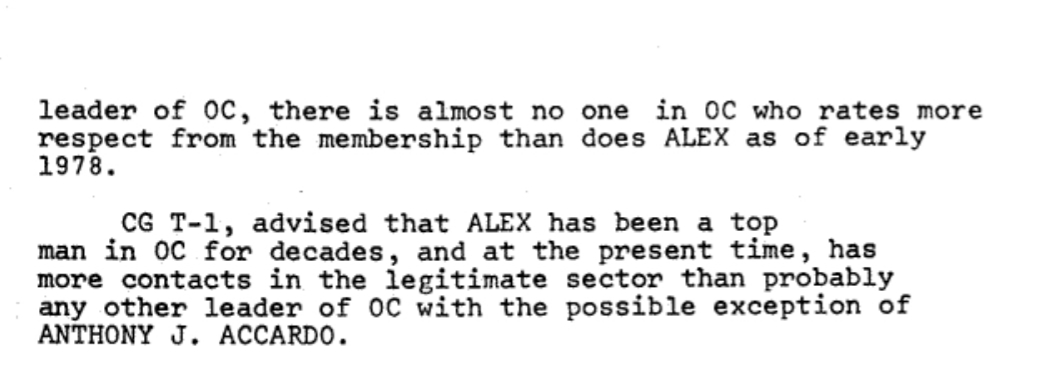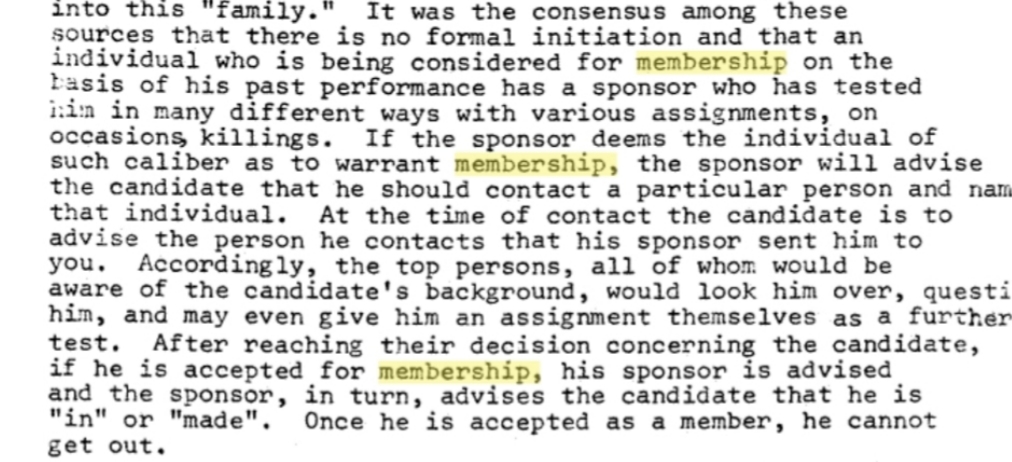Chris Christie wrote: ↑Thu Mar 19, 2020 5:30 am
Antiliar wrote: ↑Wed Mar 18, 2020 10:25 am
That's a good point. Accardo was the top boss and policy maker after Ricca died, and he and Aiuppa were both of Sicilian ancestry. It would have been their decision to "normalize" the standard LCN ceremony. Ricca may have experienced two ceremonies. He may have been a Camorrista when he was young, then was probably one of the ten men made into Al Capone's original crew after Masseria made Capone. It may have been Masseria who skipped some of the formal ceremony, which Capone and his successors followed.
Of Sicilian ancestry but American renditions who came up in the world of Chicago starting in Capone's orbit. Giancana himself was from Partanna and yet we see zero links to the Bonanno Family similarly to Salvatore Costa of Navy Street, he also didn't seem steeped in mafia tradition due to his Sicilianismo if he allegedly didn't want to have an underboss.. By the 1930's I don't think anyone was trying to mafa-ize or camorra-cize anything. The examples of people I'm not going into certainly didn't seem to have that agenda, their actions do not point to it. Even Pittsburgh which, along with Chicago, was the least Sicilian, they took off their shoes when entering the house. I'll leave it at that.
The opposing argument could be that these Chicago Italians were American and thus less influenced by the Sicilian tradition but even then, the hierarchy is not that intricate and leaves room for interpretation and for each member occupying to position to make it his own. Rappresentante or Boss, Underboss or #2, caporegime or crew boss. We've seen the structure in every city. Families were more connected, not less, between 1900 and 1960 so it makes little sense that Chicago would just decide to adopt a traditional method in the 1970's just like NY adopting a structure in 1931 doesn't make sense.
Great point about Accardo or Aiuppa being American renditions. It's hard to say that their Sicilian heritage would have influenced them to suddenly take Cosa Nostra traditions more seriously in the 1970s/80s unless there is a source who clearly says that. These aren't "zips" like Domenico Cefalu and John Gambino joining the administration of the Gambino family and promoting their own people and strengthening ties with the Sicilian mafia; by all accounts Accardo and Aiuppa were a product of the Chicago environment.
Unless there is a specific source that suggests it, it seems contradictory to say that Accardo or Aiuppa didn't care about Italian heritage (let alone Sicilian) and ran an organization that recognized non-Italians as members, yet eventually had some late life revelation about their Sicilian roots and started pricking fingers and putting guns on the table. If the argument is that they did this to strengthen their deteriorating political ties to New York, what is the evidence that New York would have even known what Chicago was doing in their own internal mafia inductions and why would Chicago members tell New York members about that? And if the decorative aspects of a mafia induction were so important, why did NY/NJ families like the Bonannos and DeCavalcantes have ceremonies where they basically just said, "You're a member"?
The end justifies the means in most cases of mafia membership and Chicago isn't unique in this way. There is a sponsor with Italian heritage, who sponsors a proposed member with Italian heritage, and the bosses of Italian heritage approve the new member, and that member has certain rules he must follow which are overwhelmingly consistent from family to family. That member's status is then universally understood by every other member.
Chris Christie wrote:
We don't know whether or not Masseria gave Capone the full ceremony or just said you're a member, given how both examples have occurred throughout history in different cases, Capone's bloody index finger is less relevant compared to his mafia-ization and the bestowing of legitimacy into a network that would have to recognize him from LA to NY. A low-class pimp associate challenging confratello Aiello in Chicago is a no-brainer as to where loyalties would lay. But Capone as BOB Masseria's capo aganst Aiello- staying the fuck outta that. People have made the argument that Capone didn't need membership to be successful because he already was. While he didn't need it to make money but he needed it to be recognized within the mafia/LCN/national syndicate, otherwise he would have been just a gang. Powerful yes, but not part of the national network. Had that happened that way they likely would have eventually been but that's neither here nor there, we have the evidence that mafia membership was a factor in everything Chicago related, past and present.
Gentile said that Al Capone was inducted into the Masseria family and instructed to kill Lombardo and Aiello, and Maniaci told the same story (without mentioning Lombardo). Gentile says that after Capone was inducted and given these instructions, he "used his power very wisely." In context, this can only mean he used his newfound authority as an amico nostra to dominate the Chicago mafia, like Merlino would do in Philadelphia. Gentile also says that Capone was the power behind LoVerde, so he wasn't trying to downplay Capone's own independent power, but he makes it clear that Capone used the political weight of mafia membership to his benefit and understood the value of it.
Let's look at the Capone narrative a little more. He was only on the streets as official boss for a matter of months in 1931. Meanwhile, he had extensive legal trouble throughout that year, was traveling to other cities on mafia business, and participating in the Castellammarese War and its aftermath. Both Maranzano's election to capo dei capi and the formation of the Commission were held in Chicago, where Capone hosted banquets and other meetings. Bompensiero also said he and Jack Dragna traveled to Chicago, likely in 1931, where Capone was holding peace meetings to settle violence in the California mafia. Once Capone was elected to the Commission following Maranzano's September 1931 murder, Capone was on the street for maybe a month, going away in October 1931.
At what point did Capone have the time to completely revolutionize the Chicago mafia into a brand new style of organization? He took over a Cosa Nostra organization, no doubt promoted his own people (as Gotti and Scarfo did), and definitely shaped the direction the family would go in, but Capone's time was extremely limited and he was barely on the street as a boss and Commission member. If the argument was that his successors were responsible for changing the fundamental organization that would make more sense, but I haven't seen convincing evidence for that either.
We know by 1931 (and much earlier), the rules allowed Sicilians, Calabrians, and Neapolitans to join Cosa Nostra, which they all did, and that birth in Italy was no longer required for members. The heavily Corleonesi Gagliano family inducted mainlanders. We know the organizations (some more than others) began to grow apart from their roots in Sicily, but they remained part of the same lineage and continuity. Capone was boss of the old D'Andrea family; Milano was boss of the Lonardo family; Bazzano was boss of the Conte family, etc. In all cases, it didn't fundamentally change the organization's structure or protocol even though different mafia cities all had qualities that made them unique.
Chris Christie wrote:
I think a High Level Researcher like B makes a good point, the ceremony has been used, altered or ignored in different groups including the most Sicilian of groups at various points in the past century. But one thing that hasn't changed is the significance of membership. All Chicago accounts point to it being a very rare and privileged distinction, as it was in Cleveland, Pittsburgh and everywhere else. And if it is rare, then the distinction of separating amico nos from associates despite an Alex or Humphries' vital importance in how the mafia ran affairs in the city is necessary.
You might think I'm a High Level Researcher, but in my city we are called Top Experts. We are nothing at all like High Level Researchers and by you calling me that it shows you know nothing.




